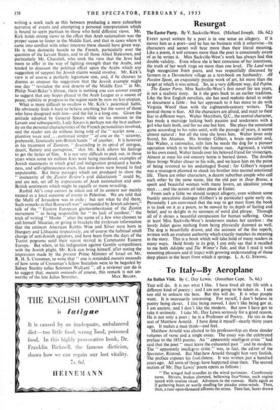Resurgat
The Easter Party. By V. Sackville-West. (Michael Joseph. 10s. 6d.) EVERY novel written by a poet is in one sense an allegory. If it moves him as a poet—and he has no business with it otherwise—its characters and scenes will bear more than their literal meaning. Like a poem, it will contain more than the poet is consciously aware of as he writes it. Miss Sackville-West's work has always had this double validity. Even where she is best conscious of her intentions, the truth of her work rings on more than one level. The Land won high recognition from poets, and was respectfully discussed by farmers in a Devonshire village as a text-book on husbandry. All Passion Spent, an exquisitely precise work of art, hit more than the target at which it was aimed. So, in a very different way, did Pepita.
The Easter Party, Miss Sackville-West's first novel for ten years, is not a realistic story. In it she goes back to an earlier tradition. Like the first English novelists, she has used realistic detail in order to document' a fable : but her approach to it has more to do with Virginia Woolf than with the eighteenth-century, writers. The central theme is fear. All the characters are afraid, and react to their fear in different ways. Walter Mortibois, Q.C., the central character, has made a marriage lacking both passion and tenderness with a girl who feels both, and for no one but him. She plays the unnatural game according to his rules until, with the passage of years, it seems almost natural : but all the time she loves him. Walter loves only Svend, his Alsatian. His brother Gilbert, a brain specialist and, like Walter, a rationalist, tells him he needs the dog for a pioneer operation which is to benefit the human race. Agonised, a victim to his own creed, Walter hands over his beloved friend for vivisection. Almost at once his old country home is burned down. The double blow brings Walter closer to his wife, and we leave him on the point of being restored to his undamaged Svend : for Gilbert's request was a stratagem planned to shock his brother into normal emotional . life. There are other characters, as decent suburban couple who call each other by the same name, like the old pair in Dear Brutus, a spoilt and beautiful woman with many lovers, an idealistic young man ... and the action all takes place at Easter.
From such a fable we should suspect allegory, even without some frankly unrealistic dialogue (Gilbert's in particular) quite early on. Personally I am convinced that the way to get most from the book is to look on it as a poem, to be moved by its depth of feeling and belief, and to delight in its sureness of word and phrase. Through all of it shines a beautiful compassion for human suffering. Once at least Miss Sackville-West's tenderness makes her careless : the lovely Juliet gains nothing from being physically doomed as well. The dog is beautifully drawn, and the account of the fire superb, written with an exultant authority which exactly matches its meaning in the story. This is a book which will take hold of many readers in many ways. Held firmly in its grip, I can only say that it recalled to me both Adolphe and The Winter's Tale, and that I read it with mounting pleasure and (I hope) with growing understanding of those deep places in the heart from which it springs. L. A. G. STRONG.


































 Previous page
Previous page